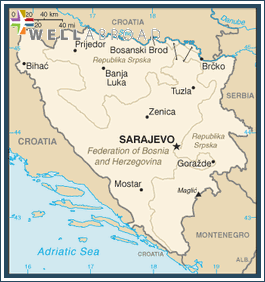|
MOST RECENT ALERTS
There's no recent alert.
|

|
|||||||||||||||
| COUNTRY OVERVIEW | ||||||||||||||||
|---|---|---|---|---|---|---|---|---|---|---|---|---|---|---|---|---|
|
| COUNTRY GENERAL INFORMATION | |||||||
|---|---|---|---|---|---|---|---|
| Language: |
Bosnian, Croatian, Serbian |
||||||
| Currency: | marka (BAM) | ||||||
| Predominant Religions: |
Muslim 40%, Orthodox 31%, Roman Catholic 15%, other 14% |
||||||
| National Holidays: | National Day, 25 November (1943) | ||||||
| Economic Status: |
Bosnia and Herzegovina ranked next to Macedonia as the poorest republic in the old Yugoslav federation. Although agriculture is almost all in private hands, farms are small and inefficient, and the republic traditionally is a net importer of food. The private sector is growing and foreign investment is slowly increasing, but government spending, at nearly 40% of adjusted GDP, remains unreasonably high. |
||||||
| Security: |
VF Army (the air and air defense forces are subordinate commands within the Army), VRS Army (the air and air defense forces are subordinate commands within the Army) |
||||||
| US Presence: |
U.S. Embassy in Sarajevo Fax: +387 33 659-722 |
||||||
| Document Requirements: |
A passport is required for travel to Bosnia and Herzegovina. US citizens do not require a visa for tourist stays up to three months. If you are not staying at a hotel (i.e. a private residence), you must register with the local police within 24 hours of arrival. If you are planning to remain in Bosnia and Herzegovina for more than three months, you must apply for a temporary residence permit from the local field office of the Foreigners’ Affairs Department of the Ministry of Security having jurisdiction over your place of residence. Your application for temporary residence permits should be submitted at least 15 days prior to the expiration of the initial three-month tourist visa. The maximum duration of a temporary residence permit is 12 months, with the possibility of an extension. The fee is 100 convertible marks (KM), or approximately 70 USD. A police certificate indicating that the applicant has no criminal record is required for this permit and should be obtained from the applicant’s state of residence in the US. For additional information please contact the Embassy of Bosnia and Herzegovina at 2109 E Street, NW, Washington, DC 20037, telephone 202-337-1500. Visit the Embassy of Bosnia and Herzegovina website for the most current visa information. |
||||||
| Major Airports: |
Airports: 28, Airports with paved runways: 8 |
||||||
| Servicing Airlines: |
|
||||||
| Risks and Precautions: |
Although the physical infrastructure was devastated by the war, in recent years there has been significant improvement, and reconstruction is progressing. Landmines remain a problem in Bosnia and Herzegovina. Localized political difficulties continue and random violence may occur with little or no warning. Bosnian criminals use firearms and explosives to settle personal, business, and political disputes. |
||||||
| Mortality Statistics: |
Infant MR total: 9.82 deaths/1,000 live births |
||||||
| Immunization Indicators: |
Required: None |
||||||
| Infectious Disease Concerns: |
Tickborne encephalitis (TBE) is widespread, occurring in warmer months in the southern part of the nontropical forested regions of Europe and Asia. The most intense transmission has been reported in Russia, the Czech Republic, Latvia, Lithuania, Estonia, Hungary, Poland, and Slovenia. The annual incidence rate of tuberculosis is high in some countries in the region. High rates of drug-resistant TB are found in Estonia, Kazakhstan, Latvia, Lithuania, parts of Russia, and Uzbekistan. Cases of diphtheria have declined (after a large outbreak in the 1990s) with improved rates of immunization. |
||||||
| Overall Quality of Medical Services: |
Although the medical infrastructure is being rebuilt, many deficits still exist. The lack of adequate medical facilities, especially outside Sarajevo, may cause problems for visitors. Because many medicines are not obtainable, travelers should bring their own supply of prescription drugs and preventive medicines. Private practitioners and dentists are becoming more common; however, quality of care varies and rarely meets US or western European standards. All major surgery is performed in public hospitals. |
||||||
| Providers in Network: |
|
||||||
| Recent Medical Threats/ Concerns/Warnings: |
Highly pathogenic avian influenza virus H5N1 has been documented in wild birds or other avian species in several of the countries in Eastern Europe. Human cases and death were reported from Azerbaijan in 2006. Avoid all direct contact with birds, including domestic poultry (such as chickens and ducks) and wild birds, and avoid places such as poultry farms and bird markets where live birds are raised or kept. For a current list of countries reporting outbreaks of H5N1 among poultry and/or wild birds, view updates from the World Organization for Animal Health (OIE), and for total numbers of confirmed human cases of H5N1 virus by country, see the World Health Organization (WHO) Avian Influenze website. |
||||||
| Communications Info: |
Country Calling Code: +387 |
||||||






